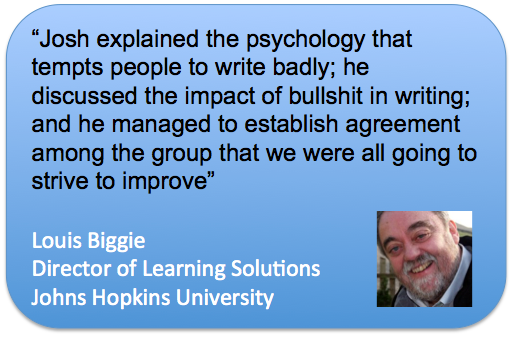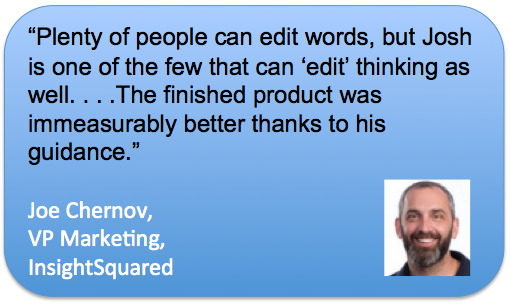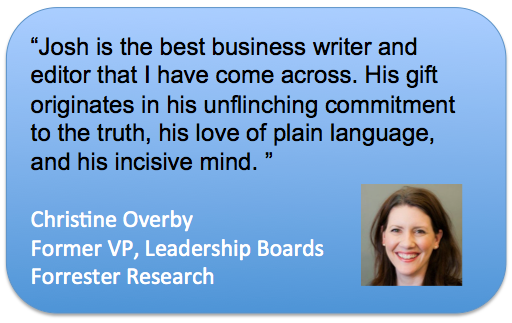How you and your company can start writing without bullshit
When I struck out on my own, I vowed to do only work that I found rewarding. If I could do that, I would have an enviable and satisfying work life. So far, I have succeeded.
The most rewarding work for me involves spreading the gospel of writing without bullshit. I’ve found two ways to do that. I help groups learn in workshops. And I help improve writing through editing.
Workshops help your department learn better writing, quickly
Louis Biggie, who manages faculty training at Johns Hopkins University, asked me to put together a whole-day workshop last fall. That material is now road-tested from sessions at other clients, including the research team at a top-five investment firm.
 People surrounded by bullshit all day long at work really do want to write better. Each skill I teach is basic, but learning them requires people to identify and change years of ingrained habits. Taken together, these skills help people to communicate far better, not just with their audiences, but with each other.
People surrounded by bullshit all day long at work really do want to write better. Each skill I teach is basic, but learning them requires people to identify and change years of ingrained habits. Taken together, these skills help people to communicate far better, not just with their audiences, but with each other.
There is nothing like examining writing from your own workplace to demonstrate how things could be better. That’s why I use examples that come from the clients themselves in the workshops.
This is not only the most comprehensive writing workshop you’ve ever heard of, it is the most fun. Participants never forget what I teach, because I use humor to reveal the corporate drivel that we must all deal with daily.
Here’s a list of what I cover, in a half-day or full-day workshop:
- Why bullshit happens
- The meaning ratio: maximizing the meaning of your words
- How to write shorter
- Effective titles and summaries: front-loading content
- Fixing bad writing habits: passive voice, jargon, and weasel words
- Preparing with the four questions: Readers, Objectives, Action, Impression (ROAM)
- Writing processes that improve success
- Collaborating without compromise
People learn skills by doing. So we do exercises on titles and opening sentences, identifying bad prose, writing directly, ROAM, and project planning.
Clients tell me that in the months that follow the workshop, participants cite the lessons they learned in their conversations with collaborators and editors. That makes me happy.
Editing improves not just prose, but people
 My favorite activity at Forrester Research was editing. That’s because it enabled my writers to attain two transcendent benefits. First, I helped smart writers to create something far better than they could have created on their own. And second, those people learned from the edits and became better writers and thinkers.
My favorite activity at Forrester Research was editing. That’s because it enabled my writers to attain two transcendent benefits. First, I helped smart writers to create something far better than they could have created on their own. And second, those people learned from the edits and became better writers and thinkers.
What energizes me is to help people, starting with idea development, then improving the structure in which they express those ideas, and then identifying the words that best embed those ideas into the reader’s mind.
 I love the diversity of these challenges. I helped a non-profit make their Web Site more impactful. I helped a writer at HubSpot to create an effective and engaging report from a mass of data about blog posts. I helped Victoria Bough to launch and improve her blog on character and leadership. I helped Dave Carroll write his book “United Breaks Guitars.” I’m working right now with an author preparing a proposal for a counterintuitive leadership book.
I love the diversity of these challenges. I helped a non-profit make their Web Site more impactful. I helped a writer at HubSpot to create an effective and engaging report from a mass of data about blog posts. I helped Victoria Bough to launch and improve her blog on character and leadership. I helped Dave Carroll write his book “United Breaks Guitars.” I’m working right now with an author preparing a proposal for a counterintuitive leadership book.
If you want better prose and better skills, then tap me as an editor for your:
- Blog posts.
- Reports.
- Book proposals.
- Web copy.
- Press releases.
- Bylined articles.
- Books.
- Anything else.
If it’s non-fiction, I can make it better — and I can make you better, too.
Go ahead, hire me
Send me a note about what you’re looking for. Email me. Call me. I’d love to work with you.